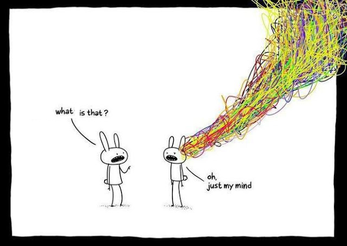 Some time ago I was asked by the Isbourne College to put together my top ten tips to support and look after our emotional wellbeing. I enjoyed writing it and thought I would share it here with you. Have I missed anything out? What's your no. 1 tip for clearing your head when things are getting you down....? 1. Nature Being out in nature is tremendously healing: even a walk around our local park can lift our spirits. When we’re feeling anxious and stressed we feel small and tight, like a tightly wound spring. Everything can feel as if it’s closing in on us. Being outside in nature immediately helps us to feel lighter and part of something much larger that ourselves. It’s a connection with this sense of space that is so healing. If you are prone to panic attacks – look up at the vastness of the sky and feel open and big. Remember, even when it’s a cloudy day - above the clouds is the spacious blue sky. 2. Gratitude Our minds are wired to find problems and difficulties – even if there aren’t any, our mind will invent some! It’s only trying to protect us from danger but the problem is we listen to closely to its catastrophic predictions and believe the scenarios it paints. To re wire this catastrophic thinking, take time to stop what you’re doing and make a mental list of all that you’re grateful for in that moment, even if it’s just the sound of birds or the feel of the ground beneath your feet. Try writing a ‘gratitude journal’ for 10 days. Before you go to sleep write down 3 things that you’ve been grateful for during the day, no matter how small. 3. Stillness and meditation Find some time, once a day if you can, for stillness and meditation. Maybe you could do it first thing when you wake up, or when you get home from work or before going to bed. It doesn’t have to be for long – 10 mins is fine but just find a few minutes to be with the breath. It doesn’t matter if you notice that the mind is full of chatter – just softly observe and then come back to the breath. Being in the present moment and just watching the mind without entering into or identifying with the drama is a great way to build emotional wellbeing and resilience. And if you really can’t fit it in everyday - try twice a week and build from there. 4. Listen to your body Sometimes we are so much in our heads that we forget to listen to important signs from our body to slow down and take care. It could be the onsets of pain, headaches or the continual merry go round of coughs, colds and minor ailments. When we’re stressed, inflammation in our body increases and hangs around. Our immune system becomes compromised and we become more susceptible to catching viruses. Stop and listen, acknowledge what your body is saying to you and work out when you can take time out for yourself. Perhaps an early night, relaxing massage or fresh air will help. 5. Ditch toxic relationships. The energy we pick up from others is important for our wellbeing too. If you are subject to constant negativity or feel you can’t be authentic around some people and feel unsure of their judgmental nature, then maybe it’s time to recognise this relationship no longer serves you. Better to have one or two close and supportive friends than lots of friends who create drama and don’t feed your soul. 6. Sort those finances Money is something we rarely talk about and consider even less when contemplating mind, body and spiritual wellbeing. However money is an important aspect of our wellbeing and not just having more to spend! Being wise and skilful with your cash can help ease anxieties and worries and the more you are aware of your finances, the less your finances can get on top of you. So practically, sort out all your necessary outgoings, see where any saving can be made (comparison websites are good for energy bills and insurances). Set some savings aside for rainy days or car repairs and live on the rest. Stay within your budget and don’t borrow unless you absolutely have to. 7. Time away from the screens Computers at home, computers at work and even computers on our phones; we cannot get away from them and being continually connected and in touch can be stressful. We have a strong compulsion to respond immediately to emails and texts and marvel at the perfect lives others are leading on facebook. Being in contact with others is great but over connectedness is not. Try and have one evening a week when the computer, TV, ipad and phone are switched off. Maybe read a book, play a game or listen to music. 8. Watching the News Much of the news is depressing and tragic and fills us with a sense of fear and uncertainty about the world. There are so many things happening in the world so who decides what’s a news worthy item and what’s not? Think about reducing the amount of time you spend watching the news and instead find news sources, which are positive, and life affirming (www.positive.news). 9. Mindfulness Finding some time to be fully present, in a non-judgemental way, is a great way to reduce anxiety. Often when we are doing tasks, our minds are caught up in thinking about the future or ruminating about something in the past and we’re never fully present with what we’re doing. How many times do we do the washing up or drink a cup of tea and 20 mins later can’t remember if we’ve done them or not! It’s because we’re not fully present with the experience. To be present we have to make it our intention to be so, our mind will not automatically do it. Then use the senses of touch, taste, sight and sound to be fully aware of what’s happening. Yes, thoughts will come in but you are aware of them, without judging them, and then bring yourself back to the present moment. Drop some mindfulness into your day and notice the difference. 10. Laugh...lots! Finally, don’t take yourself or life too seriously. Find times to be with friends and laugh. You can even join groups such as laughter yoga, which encourage you to laugh, even if nothing funny has happened! Very soon you are genuinely laughing and feeling so much better for it. You can do it by yourself in your own home too!
0 Comments
 Today I met one of my students over a lunch break at work. She has been a regular at my meditation classes and has embraced it wholeheartedly, developing a regular practice on her own as well as coming on one of my retreats at Holland House. As we spoke it was obvious she was going through a tough time with some family problems which were bringing her down and making her feel a whole range of emotions from guilty, to angry, to just downright sad. She had hit a real dip in her life and was struggling. I offered her words of comfort and listened carefully, then she said "I thought now that I meditated I wouldn't feel awful anymore, I feel a failure..." This made me stop in my tracks and realise that one of the many reasons people come to meditation is not to feel stressed, angry or unhappy anymore. They want to rid themselves of these tiresome emotions, especially if their whole lives have been spent struggling with them. They find solace and comfort in meditation and watch as their lives seemingly transform and then WHAM! Something happens to plummet them straight back into those difficult emotions again. It can feel as if they're back to square one and all those hours spent sitting and just quietly watching the breath have been for nothing. But the power and liberation of meditation is not to deny any of the ups and downs of life. It isn't meant to be a shield to protect you from the unwanted bits and only let you enjoy the good stuff! For sure, meditating can make us feel calmer and peaceful sometimes but that isn't the aim of meditation - there isn't any aim to meditation. As we sit and observe the breath and the hundreds of thoughts whizzing through our mind we develop a healthy sense of detachment between us and the thoughts. We watch them arise with curiosity and also watch how a thought will pop in to our head and the stories we build around it - adding more and more to it until one thought has invariably led us on a road to total chaos and catastrophe. It's not the initial thought or feeling that's the issue it's the stories we fabricate round it that creates the suffering. A mindfulness practice allows us the space to see this clearly and to watch the process without judgement. Then, when a difficult feeling rises in our day to day lives, we can be aware of what we're adding to the thought or feeling. And as we observe and notice, we have the space between the thought and action to decide what would be helpful here. Another great feature of meditation is that we are able to see the ephemeral nature of our thoughts and feelings, nothing lasts and we are in a constant flow of feelings that come and go. This gives us tremendous comfort when something difficult arises - we know it will not last and as we become more skillful we notice that it's the stories that we add to the thoughts and feelings that actually make the difficulties last longer. So meditation isn't about getting rid of anything unpleasant and only cultivating the good feelings. It's about have a radically different relationship with our mind and being able to navigate, with increasing equanimity, through the rich juiciness of life - the good and the bad! |
AuthorMusings of an old meditation teacher... ArchivesCategories |
Privacy policy |
Cookie Policy |
Website terms and conditions |
Contact |
'Meditation is not evasion. It's a serene encounter with reality.'
|
Copyright © 2015

 RSS Feed
RSS Feed